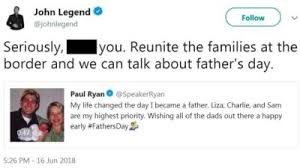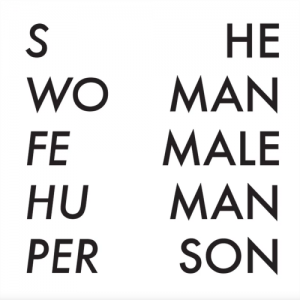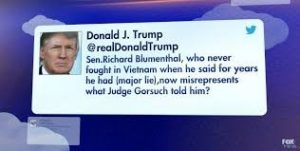Over the course of the semester we have written a total of three journal entries. These journals allowed us to practice analyzing text and to understand different rhetorical strategies as used by historical figures who were proficient in effectively using these strategies. Completing these journals taught me how to use rhetoric to convince my audience of certain ideas using strategies like logos, which is the use of logic, or pathos, which is the use of emotion. I learned about how important visual aids are when trying to make a point. In my journal on Hitler’s Mein Kampf , I used a screenshot (pictured below) of a tweet from famous artist John Legend, to really drive home to point that America’s social platforms can be used to bring the public’s attention to issues concerning our government. I think that these journals were interesting and a great way to practice and sharpen my writing skills. I could have focused on giving more through answers to the prompts, but I did improve on my analyzing skills when reading these passages. The most difficult challenge I faced when writing these journals would have to be finding the media/ visual aids that best fit what I was arguing for, but I overcame this issue by finding pictures that I felt best represented my ideas through careful searching.
John Legend screenshot:

Journal One:
Harper Ward
Dr. Guler
English 400
31 January 2019
Journal Entry
Keough’s article defines the term ‘terministic screen’ and says that “a terministic screen directs the attention of the audience along a certain line of thought” (p.3). This is the direct definition of the term taken from the text, Keough goes on to expand on the definition as well as give alternative ideas of what the definition could be. Appearing just below the first definition on the same page Keough states that a terministic screen “…is a definition of reality” (p.3). Keough uses Kenneth Burke’s explanation in her paper to further explain what the function of a terministic screen is by sharing his three main points which are, reflection, selection, and deflection. Reflection refers to the way terminology is seen and heard in reality, selection is what parts of reality are shared, and deflection are the parts of reality that are ignored in favor of others.
The relationship between terministic screens and sexist language is that, “…sexist language acts as a terministic screen…”, which is talked about on page 6. Historically Wilma Heide, the President of the National Organization of Women, gave a speech in 1972 about sexist language. In her speech Heide talks about “linguistically unjust phrases” (p. 6), and how while our society is changing our language is not. Our feminine designations are just modified versions of the original male terms, examples given in the article show the correlation by using a few different terms. One such example was how the word waiter was changed into waitress on page 7. This practice of having our terms so restricted to being either man or woman is detrimental to people wanting to use the term on an opposite sex or have it not attached at all to a gender.
Another point raised in the article is that our language perpetuates stereotypes and causes a rift between man and woman. The quote, “…it [language] is not an accurate reflection of the commonality between men and women” (p. 8), is something that stood out in the paper. Keough goes on to say that our language is hindered by the fact that we have separated our identities into either a masculine or a feminine category when, in reality, that is not the case. We all have both masculine, feminine, and androgynous qualities. This is a fact that needs to be recognized by us as a society before we can begin to make the necessary changes to our language. The way we use our language is a reflection of how things were when men were seen as better than women. In today’s times women are gaining more and more acknowledgement which is deserved and in my own opinion, better late than never. Yet by using terms like ‘man’ to refer to the entirety of humanity, it is exclusionary of women and people who identify outside of traditional gender norms. It is in this way that our language is sexist because using exclusively masculine terms to refer to ourselves we strengthen the notion that it is the men who are the representatives of our race and that all others are inferior.

Journal Two:
Harper Ward
Dr. Guler
ENGL 400
5 February 2019
Journal Entry
It seems that Burke’s rationale behind analyzing Hitler’s Mien Kampf is to discover what it is that went so wrong and works towards preventing it from happening in America. Burke says that, “Hitler found a panacea…that made such sinister unifying possible…” (p. 192) and “…he put his cards face up on the table, that we might examine his hands” (p.192), which can be interpreted as Burke saying that he is analyzing this work because it’s out there in the world for anyone to read, so why shouldn’t we look and decipher everything this text has to offer.
The overall argument about Hitler’s rhetoric was his “…corrupt use of religious patterns…” (p. 201) and how it impacted the words he chose to use to sway people to his side. The, “bastardization of fundamentally religious patterns of thought,” (p. 219) were, in essence, what drove people to believe in him and his cause.
Hitler’s ‘unification device’ has four main points. The first is ‘Inborn Dignity’, which is something the German population loved because they had just lost World War I. ‘Inborn dignity’ is saying that just by birth Aryans are better than any other race. By saying this he was pandering to the needs of the citizens, they wanted to be reassured they were superior after a loss, even if it meant tearing other people down. The second feature is, ‘Projection Device’. It is described by Burke as “The “curative” process that comes with the ability to hand over one’s ills to a scapegoat, thereby getting purification by dissociation” (p. 202). This feature seems to give the people something to rally against, a common enemy that they can physically fight. The third point was ‘Symbolic Rebirth’, which combines the previous two features after they have been accepted by the people. Believing they are superior and then given a cause to fight for, allowed them to look at their actions in a positive way. The symbolism in the term ‘Symbolic Rebirth’ is a change of how they view their race. The fourth and final point is ‘Commercial Use’. Hitler was selling his ideas, his movement, until it was picked up by people willing to invest in his cause.
Burke, in the conclusion of his analysis, tells the readers to, “…find all available ways of making Hitlerite distortions of religion apparent, in order that politicians of his kind in America be unable to perform a similar swindle,” (p.219). He wants people to learn from history, so that we may not repeat it. The burden of calling out those who would trick the public with false statements and outright lies has been placed upon the citizens’ shoulders. We, in America, do this with much less finesse and propriety than what Burke was most likely expecting. On social platforms such as Twitter and Facebook, we create groups or profiles so that we can call out our elected officials when they lie or do something that is not in the best interests of a particular group.



Journal Three:
Harper Ward
Dr. Guler
English 400
3/21/2019
1) Why would Thoreau’s essay be called “Civil Disobedience”?
Thoreau’s essay can be called “Civil Disobedience” because of the direct definition of civil disobedience. “The refusal to comply with certain laws or to pay taxes and fines, as a peaceful form of political protest,” (dictionary.com) is the definition of civil disobedience, and Thoreau’s essay gives a strong case for refusing to pay your taxes and follow laws put into place by lawmakers, or in a better term the government.
2) According to Thoreau, what is the definition of a government?
“Government is at best but an expedient; but most governments are usually, and all governments are sometimes, inexpedient,” (Thoreau 1).
3) Thoreau suggests that “We should be men first, and subjects” What is the difference between the two? Why do you think Thoreau makes this suggestion?
When Thoreau suggested that we are men first and subjects second, he was talking about the idea that we are people first and then other labels second. In this instance he is saying we function as people first and then a soldier, or a citizen, or a colonel. He makes this suggestion as a sort of warning to remind the reader to think of their actions in a different light.
4) Do you think Thoreau looks down on soldiers, captains, generals, etc? Support your answer with textual evidence (from what he actually says in his essay).
Thoreau looks down on soldiers, captains, and generals because he doesn’t believe they have the agency to think for themselves. They are people who have given up their freedom to follow someone else’s orders. “Now, what are they? Men at all? or small movable forts and magazines, at the service of some unscrupulous man in power?… such a man as an American government can make… a mere shadow and reminiscence of humanity,” (Thoreau 2). He describes these military men in a derogatory way to show how they are less then others in his eyes.
5) What examples does he cite of conscientious men that were made the enemies of society (but were later vindicated and are now held in high esteem)?
“Heroes, patriots, martyrs, reformers in the great sense, and men…” (Thoreau 2) are the examples he chose to use to support his claim that some men can be seen as enemies but they are really good and just men.
6) How does Thoreau exercise “civil disobedience”? What happens as a result? Does his action fit in with your view of active citizenship? What else would you have done if you were in his shoes during his time period?
He did not pay his poll-tax because he disagreed with some government policies. He spent the night in jail. This action does not fit in with my view of active citizenship because I believe that if something needs to be protested, people should organize into a group and go speak at an open forum where our voices can be heard, but sometimes we have to follow rules we disagree with, that’s just a part of life. If I had been him, I would have done what the law demanded and then made sure I did everything I could to bring attention to the injustice of the law and hopefully make a change so that it doesn’t happen again.
